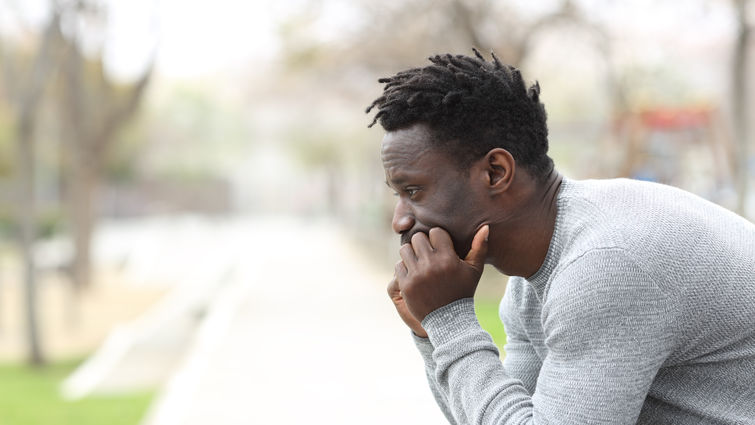
African American men are more likely to develop prostate cancer than other men, get prostate cancer at a younger age, and tend to have more advanced disease when it is found, according to the Centers for Disease Control and Prevention. They are also twice as likely to die from prostate cancer than other men.
Researchers at Loma Linda University Health contend that the disproportionate amount of chronic stress African Americans face is partly responsible for the alarmingly high incidence and mortality rates from prostate cancer observed in African American men.
The Center for Health Disparities and Molecular Medicine (CHDMM), led by Marino De Leon, PhD, is conducting innovative research to determine how the interplay between biological, socioeconomic, environmental, or cultural factors contribute to the disproportionate burden of chronic diseases such as cancer and diabetes affecting minority populations.
This National Minority Health Awareness Month, Carlos A. Casiano, PhD, associate director of the CHDMM, highlights his and colleagues' findings from ongoing research and initiatives regarding racial disparities in prostate cancer.
When you take into account these life stressors that predominantly affect minority populations and combine them with biological factors, you begin to see an increased incidence and mortality of certain cancers in certain populations, like prostate cancer in African American men.Carlos Casiano
Casiano says lifestyle and environment can contribute to cumulative psychosocial stress, a type of chronic stress that builds over time and influences quality of life and health status. Stressors include: having low socioeconomic status, living in areas with poverty, high crime, or crowded housing, having limited access to healthcare or education on diseases affecting one’s population, facing racism, and encountering stigmas associated with health conditions.
“When you take into account these life stressors that predominantly affect minority populations and combine them with biological factors, you begin to see an increased incidence and mortality of certain cancers in certain populations, like prostate cancer in African American men,” says Casiano, who has been studying biological and clinical aspects of prostate cancer for over two decades.
Cumulative stress leads to constantly elevated levels of cortisol, the body's primary glucocorticoid stress hormone, he says, which in turn amplifies the body's response to stress in ways that could be harmful to our health. He and colleagues at LLU and other institutions have linked this elevated glucocorticoid signaling with prostate tumor aggressiveness, including resistance to therapy, particularly for prostate cancer in African American men.
Under usual healthy conditions, glucocorticoid signaling elevates temporarily to help the body cope with short-term stress before subsiding again. But in African American and other minority populations, Casiano says glucocorticoids remain elevated because of the constant life stressors.
The science is telling us that the disparities we see among African American men with prostate cancer result from an interplay between socioeconomic and life-associated factors with biological and genetic factors.Carlos Casiano
Casiano says experts in the field have long known that prostate cancer is driven by androgens, another group of steroid hormones, and have recently discovered glucocorticoid signaling's contribution to prostate cancer.
Traditional prostate cancer treatments have thus focused on administering anti-androgens to shrink patients’ tumors. But Casiano says recent studies have shown that when medications block androgen signaling in prostate cancer, tumors may activate glucocorticoid signaling to mimic the effects of androgens.
Casiano and his colleagues suggest that anti-androgen therapy, while providing a benefit to patients with recurrent prostate cancer, eventually fails, particularly in patients with already high sustained levels of glucocorticoid, like African American men. It could even lead to more therapy resistant prostate tumors due to increased activation of glucocorticoid signaling. His research team has been investigating this hypothesis with funding from the National Institutes of Health (NIH).
“The science is telling us that the disparities we see among African American men with prostate cancer result from an interplay between socioeconomic and life-associated factors with biological and genetic factors," Casiano says. "If we can show a link between psychosocial stress and increased risk of prostate tumor aggressiveness, the next questions would be about how to address those factors with adequate interventions."
LLU faculty are taking action to mitigate the prostate cancer health disparities experienced by African American men in the community through Project CHANGE (Changing Health for Adult Men with New and Great Experiences). This CHDMM’s community engagement initiative co-led by Susanne B. Montgomery, PhD, associate dean and professor at the School of Behavioral Health, Lisa R. Roberts, DrPH, FNP-BC, professor and research director for the School of Nursing, and Casiano, seeks to increase awareness of chronic diseases affecting Black men.
CHDMM’s data shows that the Inland Empire region ranks fourth highest in the state for the rate of prostate cancer incidence in Black men. San Bernardino County ranks third highest in the state in terms of Black men’s mortality rate from prostate cancer, while Riverside Country ranks eight highest.
For many, this was the first time that they felt heard, fully respected, and given the opportunity to reflect on their own health risks with a provider.Susanne Montgomery
Project CHANGE’s health fairs offer Black men in the Inland Empire the opportunity to undergo screenings for diseases that disproportionately affect them, such as prostate cancer and diabetes, and participate in LLU's prostate cancer health disparities research.
“When meeting the men in the community, we learned that discussing issues around prostate cancer is highly personal and sensitive,” says Montgomery. “These health fairs provide Black men a space where these discussions can take place within their own community, in addition to offering them other health screenings and health counseling. For many, this was the first time that they felt heard, fully respected, and given the opportunity to reflect on their own health risks with a provider.”
Hundreds have benefited from these health fairs. Casiano says research data and biospecimens donated by past health fair participants led to several peer-reviewed publications and grant applications to NIH.
To learn more about ongoing research at the CHDMM, visit medicine.llu.edu/chdmm.
Learn more about prostate cancer care offered at the Cancer Center online.
